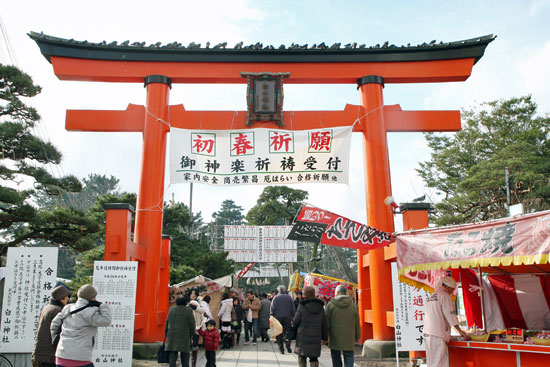
Shinto is Japan’s domestic religion While Christianity or Buddhism is national religion and anyone could be believer.Confucianism is rather philosophy than to be religion.When we seems religions as the things to consider about after death, while philosophy concern how to live this life.
1.神道【SHINTOU】/Shintoism
2.仏教【BUKKYOU】/Buddhism
3.儒教【JYUKYOU】/Confucianism
4.Other faith
1. 神道【SHINTOU】/Shintoism
All Japanese are natural-born Shintoist.It doesn’t mean Shinto is national religion,constitutions of Japan promise Religious liberty and separation of government and religious.
All babies born in Japan belong to the nearby shrine as 氏子【UJIKO】member of the community.
Traditionally,new born baby is brought to nearby shrine by parents as greeting .▶︎初宮参り

They also go to shrine for express the feeling of thanks to live safety when they become three, five,
and seven years old.▶︎七五三
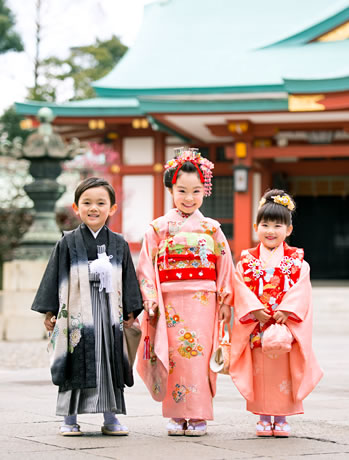
After they become adult, many Japanese people visit shrine every beginning of
the year ▶︎初詣で

Wedding ceremonies are hold in Shinto style.
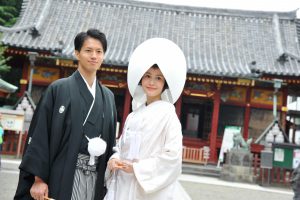
Men join to regional festivals hold by shrine every, especially summer.▶︎祭り
氏子【UJIKO】from same shrine become a team to transmit
お神輿【O-MIKOSHI】 or山車【DASHI】.
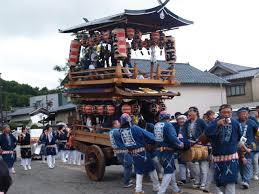
Many food stools are appeared around 神社【JINJYA】 in Summer 祭【MATSURI】festivals and of
course everyone can join it.
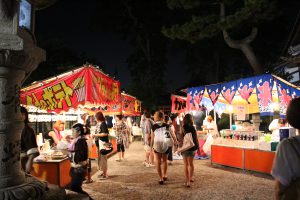
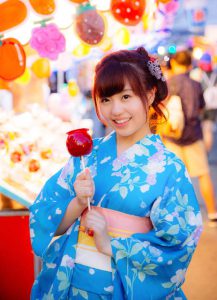
⇒Famous 夏祭【NATSU-MATSURI】Summer Festivals in Japan
All these events are naturally done as a traditional culture and they
are not very conscious as religious events.
神主【KAN-NUSHI】and 巫女【MIKO】
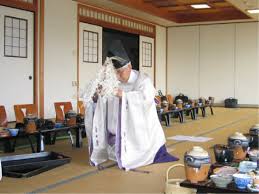
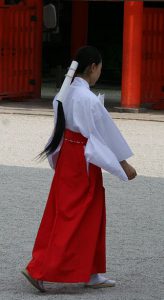
おみくじ
お守り
︎神棚【KAMIDANA】Small 神社【JINJYA】shrine for each home.
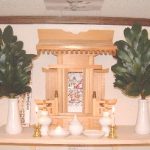
2.仏教【BUKKYOU】/Buddhism
Nowadays, Japanese Buddhism deal with funerals and memorial services hold after
7days,49days,1year,3years,7years after one’s death.

People go to the temple and pray for tombs of ancestors in お盆【O-BON】in summer and
お彼岸【O-HIGAN】in Spring and Autumn.
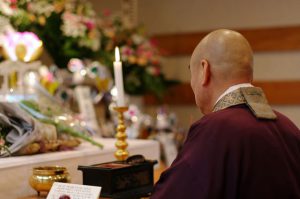
After Buddhism has brought from Eurasia continent ,many unique sect has
been appeared and developed in Japan.
1.飛鳥【ASUKA】erea (5th-6th)
In 5 century, Buddhism was imported from peninsula and continent.There was a conflict with Shintoism power at first, but 聖徳太子 said “We make harmony precious” and after many unites and separations with Shintoism in the hist0ry, they are peacefully existing together nowadays.
2.奈良【NARA】erea(710-793)
Buddhism become a tool to stay and protect national country and it become one part of government official system.
南都六宗と呼ばれた、三論宗、成実宗、法相宗、倶舎宗、律宗、華厳宗などが大勢を極めた。
聖武天皇invited 鑑真from 唐 and constructed 唐招提寺which is famous for huge 大仏.
The idea called 本地垂迹説 and many Shintoism KAMIs are seemed to be incarnation of Buddhas.
Then,KAMIS and BUDDHAS are united in this time until 明治【MEIJI】era’s(1872)a law “Order separation of
神【SHIN】 and 仏【BUTSU】”is issued.
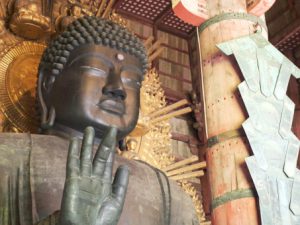
3.浄土宗【JYOUDO-SYUU】:”Paladice land” Sect
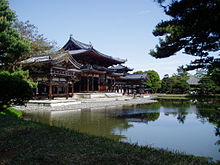
At first, 浄土宗【JYOUDO-SYUU】:”Paladice land” Sect became popular in 平安【HEIAN】period(794-809) .
In末法【MAPPOU】 ;last darma time; It is said that after 500 years of Buddha’s death, his taught will be forgotten and world would be confused and desolate.
末法【MAPPOU】time people couldn’t this life and hoped their happiness into next future life after they dead.
Priest 法然【HOUNEN】 said believed 阿弥陀仏【AMIDA-BUTSU】;AMIDA BUHDDA ,who will save human and make reborn them into his Paradise land after people death.浄土式庭園【JYOUDO-SHIKI-TEIEN】;Pure Paradise land style gardens are built here and there.
親鸞【SHINRAN】 (1173-1263) improved this thought into
浄土真宗【JYOUDO-SHIN-SYUU】TruePure/Paradise
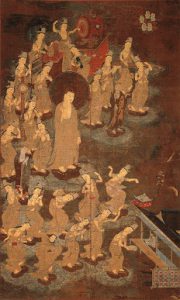
If people only said 南無阿弥陀仏【NAMU-AMIDABUTAU】many times,
they can reborn to Amida Buddha’s Pure land even wicked men.
南無【NAMU】means believe strongly,dedicate to something and 阿弥陀仏【AMIDA-BUTSU】is AMIDA-BUDDHA.
So, 南無阿弥陀仏【NAMU-AMIDABUTSU】means “I believe AMIDA-BUDDHA strongly”.This is most popular and shortest Buddhism word in Japan.
This sect was welcomed among common people and came to have large power, so
親鸞【SHINRAN】 was persecuted by traditional sects and distributed to 越後【ECHIGO】/nowadays 新潟【NIIGATA】Prefecture and he continued missionary
there.
日蓮宗【NICHIREN-SYUU】
密教【MIKKYOU】 空海【KUUKAI】
禅宗【ZEN-SYUU】
In 室町【MUROMACHI】 era
茶道 華道 建築(書院造) 庭(枯山水) 水墨画Many culture was born.
3.儒教【JYUKYOU】/Confusianism
儒教【JYUKYOU】or Cunfusionism was learned especially in Edo period (roughly 1600-1800) in 江戸【EDO】Feudalism society.
Nowadays, 孔子【KOUSHI】, 孟子【MOUSHI】, 孟宗氏【MOUSOUSHI】appear in Japanese school ‘s public text book.Especially for 孔子【KOUSHI】 are very popular.
孔子【KOUSHI】(BC552-BC479) is Ancient China;春秋【SHUN-JYUU】erperiod’s philosopher.
⇒ COLUMN;Japan has been influenced by this 春秋【SYUN-JYUU】 period’s culture very much.
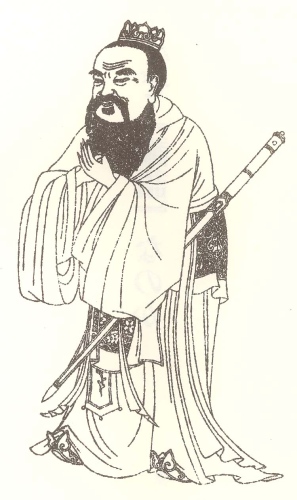
A lot of presidents of companies, headmaster of educators emphasizes KOUSHI’s teachings and philosophies.君子【KUNSHI】The man of virtue who have real love, naturally noble
Famous 孔子【KOUSHI】’s t
過ちて改めざる
これを過ちという
良心に照らして
少しもやましいところがなければ、
何を悩むことがあろうか。
何を恐れることがあろうか。
義を見てせざるは
勇無きなり
己達せんと欲して
人を達せしむ。
自分自身に対する誠実さと
他人に対する優しさ、
すべてはこの二つに包括される。
君子は和して同ぜず、
小人は同じて和せず
学びて思わざればすなわち罔(くら)し、
思いて学ばざればすなわち殆(あやう)し
君子の九思(心掛けるべき九つのこと)
1.物を見るときは、はっきり見る
2.聞くときは、誤りなくしっかりと聞く
3.表情はおだやかに
4.態度は上品に
5.言葉は誠実に
6.仕事には慎重に
7.疑問があれば、質問する
8.みさかいなく怒らない
9.道義に反して利益を追わない
朝(あした)に道を聞かば
夕べに死すとも可なり
徳は孤ならず
必ず隣あり
富貴は
浮雲のごとし
- 孔子 -
【意味】
人の道に外れて得た富や地位は、浮き雲のようにはかないものだということ。
- 孔子 -
【意味】
徳のある人は孤立することがなく、よき協力者が必ず現れるということ。
孔子の名言(3)
名言・格言
良薬は口に苦くして病に利あり
忠言は耳に逆らいて行いに利あり
- 孔子 -
【意味】
良薬は、苦くて飲みにくいが病気には効く。よい忠告は、聞くのはつらいが反省し行いを正せば、自分のためになるということ。
名言・格言
悪に報いるには正義をもってし、
善に報いるには善をもってせよ。
- 孔子 -
名言・格言
君子は平安でのびのびしているが、
小人はいつでもくよくよしている。
- 孔子 -
名言・格言
高貴な人間は自分自身に、
平俗な人間は他人に、
要求を課する。
良薬は口に苦くして病に利あり
忠言は耳に逆らいて行いに利あり
- 孔子 -
【意味】
良薬は、苦くて飲みにくいが病気には効く。よい忠告は、聞くのはつらいが反省し行いを正せば、自分のためになるということ
- 孔子 -
【意味】
朝に人としての大切な道を知ることができれば、その晩に死んでも心残りはないということ。
過ぎたるは
なお及ばざるが如し
- 孔子 -
【意味】
度が過ぎることも不足するのと同じように良くないということ。
- 孔子 -
【意味】
学んでも考えなければ、はっきり理解した状態にならない。また、考えるだけで学ぶことがなければ、独断に陥り危険であるということ。
- 孔子 -
【意味】
優れた人物は、人と協調するが主体性を失わず、小人物は、表面では同調するが心から親しくなることはないということ。
- 孔子 -
名言・格言
人の本性はみなほとんど同じである。
違いが生じるのは
それぞれの習慣によってである。
- 孔子 -
【意味】
自分が目的を達成しよう思うときは、まず人を助けてその人の目的を遂げさせてやる。仁者は事を行うのに自他の区別をしないということ。
知らざるを知らずとなす
これ知るなり
- 孔子 -
【意味】
知らないことを知らないと自覚する。それが本当の知るということ。
巧言令色鮮し仁(こうげんれいしょくすくなしじん)
- 孔子 -
【意味】
言葉巧みで、表情を取り繕っているものに、誠実な人間はほとんどいないということ。
- 孔子 -
【意味】
誰でも過ちを犯すが、それに気づきながらも改めようとしないことこそ、本当の過ちであるということ。
leaders are decided by 天【TEN】or heaven depends on their 徳【TOKU】virtue.
5 elements seems inportant in Japanese 儒教【JYUKYOU】are
1.仁【JIN】 Humanity
2.義【GI】 Responsibility Righteousness
3.礼【REI】 Politeness
4.智【CHI】 Wisdom
5.信【SHIN】Trust
Japanese YAKUZA especially value 1 + 2= 仁義【JINGI】.

![]()
A title of this famous movie is “Battle without 仁義【JINGI】”,anyway…
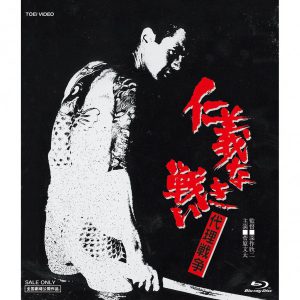
The idea of 易姓革命【EKISEI-KAKUMEI】(King’s Name Revolution) ;The leaders changes depend on person who really have TOKU Virtue.
Those all are just my opinions, please do not care if you thought it’s different from your believe.
I respect your way of thinking,too.
▶︎Japanese Hisotry

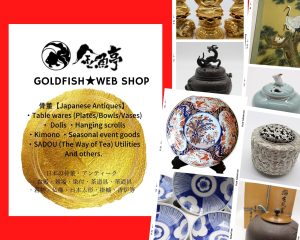
Leave a Reply